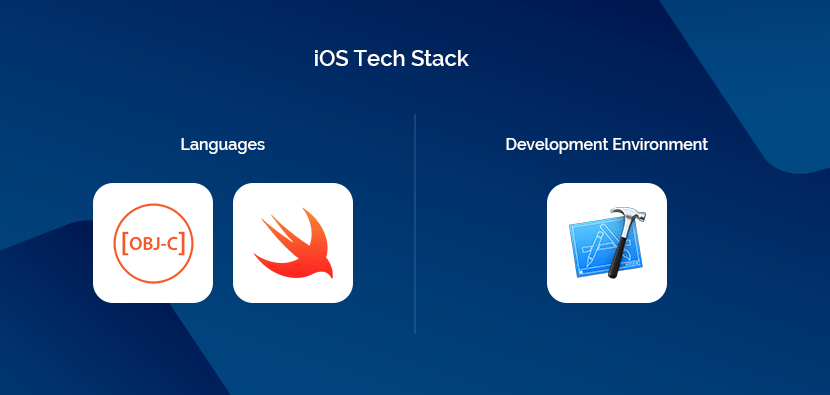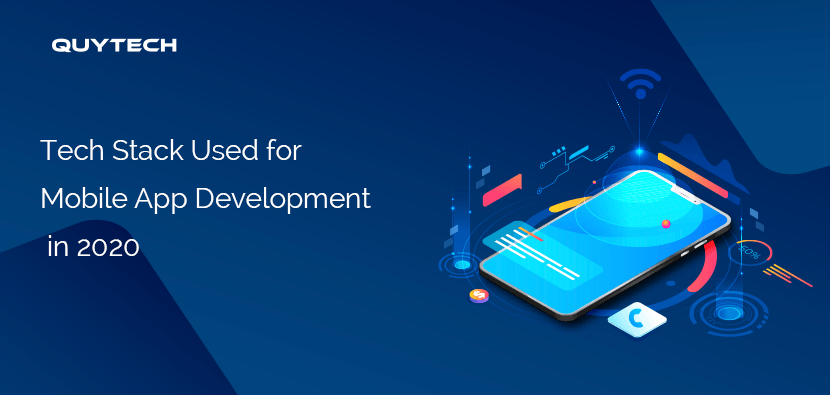Mobile applications are no less than a necessity for a startup and enterprise. Check out these statistics to know why?
According to Statista:
- There are more than 2.56 billion apps available on the Google PlayStore.
- The number of apps available on the Apple Store is more than 1.85 million.
- Users downloaded more than 24.3 billion apps from Google PlayStore.
- 21% of millennial access an app more than 50 times in a day.
- An average smartphone user uses approximately 30 apps each month.
- The total number of smartphone users is expected to grow by 700 million in the next few years.
Now, when you start building a mobile application, the first question that comes to mind is: What technology stack should be used to make a mobile app a chartbuster on the Playstore or App Store? The right technology stack for mobile app development also makes your app scalable and maintainable. Here, in this article, we have listed the most popular mobile app development approaches and the technology stack experts’ recommend building such apps:
Native app development
This type of development include programming languages, SDKs (Software development kits), IDE (integrated development environment), and other platform-specific tools offered by a particular operating system (Android or iOS).
Latest Mobile App Technologies stacks to develop iOS apps in 2021

To build a native app for the iOS platform, you can consider the following mobile app technologies stack:
- Toolkit- If you are using Swift as a programming language for the iOS app development, then the toolkit you will need to choose is Apple XCode. Equipped with an advanced graphical editor, debugging tools, and other features, XCode can create mobile as well as desktop iOS apps.
- Programming Languages- To develop an application for the iOS platform, the most popular languages are Objective-C and Swift. The former offers object-oriented capabilities and facilitates a developer to use a dynamic runtime environment. The latter is more functional and offers inline support for changing data and text strings. The dynamic libraries Swift includes can be directly uploaded to memory, which makes the app to consume less storage space and perform high. To know, which among these two will be perfect for your app development project, reach out to a custom mobile app development company.
- SDKs- iOS SDK is the software development kit that comes up with an API, which connects the software app and the platform. The iPhone SDK offers various tools for Apple’s touchscreen interface.
Latest Mobile App Technologies Stacks to develop Android apps in 2021

To create a native app for the Android platform, you can consider the following technology stack for mobile app development:
- Toolkit- You can use Android Studio and Android Developer Tools as the toolkit while developing an Android application. The former offers debugging tools, code editing, various performance tools, and has a flexible development & deploy system. Using Android Studio, you can build creative and high-performing apps. With ADT, the second toolkit, you can get support for developing an Android application. The toolkit also allows developers different on-device tools for debugging, completely scriptable test automation support, and other features.
- Programming language- Kotlin and Java are the two popular languages for developing an Android application. The former comes up with various open-source tools as well as libraries; the latter is lightweight, clean, and wordy. Kotlin is a preferred choice for developing Android Studio.
- SDKs- To embed the latest features, the developers should download and install the software development kit of each version for a specific phone. They can download the Android SDK separately. Both the Android and iOS comes up with their separate development tools, SDKs, and interface element.
Benefits of developing a native app
- Full device integration and completely secure
- Excellent UX
- Highly responsive
- Fast performance
Cross-platform App Development
A cross-platform application can be used on multiple platforms (Android, iOS, etc.).
Tech stack to build a cross-platform app

- Xamarin and C#
Using Xamarin, a cross-platform app development tool, developers can make the most of code reusability for all the major platforms. The tool uses C# as the programming language for writing codes. This language comes up with IDE support and vast tools.
- React Native and JavaScript or TypeScript
Using React Native as a framework for developing a cross-platform app gives the app the ability to run on multiple platforms with all the capabilities of the native. The reason behind this fact is that the basic UI building blocks this framework uses and the platforms (Android and iOS) have are exactly similar. For developing applications using React Native, programmers write and run the logic in JS. Apart from JavaScript, the other programming language that can be used for development is TypeScript.
Benefits of developing a cross-platform app
- Affordability
- Simple to launch and update
- Multiple platform coverage
- Code reusability
- High development speed
Hybrid App Development

Hybrid applications are developed using common web Mobile App Technologies and these are deployed in a native container, which utilizes a mobile WebView object.
Latest Mobile App Technologies to build a Hybrid app
- Ionic
Ionic, the Angular-JS framework, has similar advantages as that of the Angular. In fact, the native look, required to build hybrid applications, is also implemented effectively in this framework.
- PhoneGap or Cordova
Cordova is an open-source framework using which developers can run HTML or JS-based apps within a particular native container. It supports various frameworks as well as libraries, including Angular.js and Knockout.js.
Benefits of a Hybrid application
- You can create one application for multiple platforms
- You can develop and maintain your app without any hassle
- It is inexpensive
How To Choose The Right Tech Stack For Mobile App Development?
To decide the best technology stacks for mobile app, you need to consider the below-mentioned factors first:
- Project’s type- The type of your project is one of the prime factors that should be taken into consideration before choosing the mobile app technology stack. For instance- To build a complex and high-performance custom app for a particular platform, it is advised to go for native app development using Kotlin, Java, and other such languages.
- Project’s idea- If you are a startup that wants to develop an app for validating your product idea, attract your targeted audiences, and outdo your competitors, then cross-platform app development is an apt choice. React Native is a recommended framework to build such an application quickly and in a low budget.
- Launch time– If you want to release your app in a short span of time, then it is required to build it quickly. In such a case, you need a language or framework that comes up with various ready-made solutions for time-consuming functions such as social media integration.
Read More: Major Factors That Impact Your Mobile App Development Cost
Bottom Line
With people using smartphones for almost every task (online shopping, ordering food, booking flights/hotels, listening to music, watching videos or movies, etc.), the use of mobile applications is increasing at an unprecedented rate. That’s one of the main reasons why businesses are going mobile. To develop a successful app, the first consideration is choosing the right tech stack. To know more about the technology stack for mobile app development that is being used by expert developers worldwide, read the article. And, in case, if you want to develop a mobile application for Android or iOS, then choose a reliable mobile app development company or hire mobile app developers.

